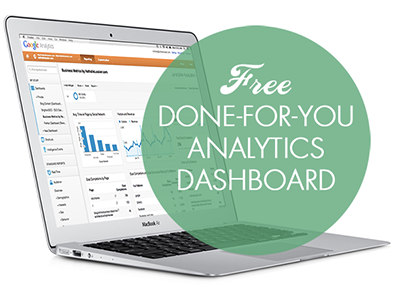
When you have a brick-and-mortar business where you actually see customers and how often they are walking into the doors of your business and buying things, it’s easy to know if you’re on track or not.
You can usually run a quick cash report and see how much money you made that day.
When it comes to an online business, all of that same information is spread out into different systems.
Maybe you have some money coming in through PayPal…
Perhaps you get paid for your books on Amazon at the end of each month…
You have recurring payments from clients and affiliate income coming in at different times…
Then there are website visitors and email subscribers to track too.
If you don’t have a system to track all of these metrics then your business might as well be blowing in the wind. And that’s fine if you’re making enough money but this “not knowing” can be the cause of a lot of unnecessary uncertainty and anxiety.
Tracking Metrics: Paradise by the dashboard lights
So here is a super simple way for you to start tracking through the concept of “the dashboard”.
When you’re in a car, your dashboard tells you the most important details necessary to keep the vehicle running.
Things like how fast you’re going, how much gas is left in the tank, and if the engine is running too hot or not.
At the end of this video we’ve shared a sample Company Dashboard spreadsheet that you can use to set up your own business dashboard.
When it comes to your business dashboard here are the most important things that need to be tracked:
- The first and most important metric to track is income and expenses.
I recommend checking this daily, even if you don’t have anything to report each day.
You’ll want to have a bookkeeper who can update and maintain this system for you in the longterm, but when you’re just getting started it makes sense for you to do this yourself.
It’s also a great exercise because it helps you have your finger on the pulse of your business, so you know exactly how much money you’re making and spending so you’re never caught unaware. - Another metric that you should be tracking is business growth. For online businesses, that means traffic and subscribers entering into your world and sales process.
I also like to take a step back and see what marketing activities are coming up that will lead to more traffic and subscribers down the line.
It’s easy to rely on what’s currently happening in your business, especially when things are going well, but it’s really helpful to have a look at what’s coming up that will generate an increase in traffic and subscribers.
Try taking a look at where sales are coming from, and how you can increase the sources of those sales.
You can use this dashboard when making decisions about your business like where to advertise, what other places to be featured, and also what products and services might not be selling as well.
This dashboard can help you decide what products and services to retire to help you streamline your offerings. - You might have other important numbers to track in your business, like refund rate, website uptime, or reviews on your book… these are all great metrics to track and improve upon!
Doing this daily or weekly allows you time to reflect on what worked in the past week and what changes you might need to make.
If you have an existing system that helps you track your metrics and see how fast your business is growing and if you’re running out of gas or not, I’d love for you leave a comment below and let us know what it is and how it works.
I love discovering new software solutions and systems!



